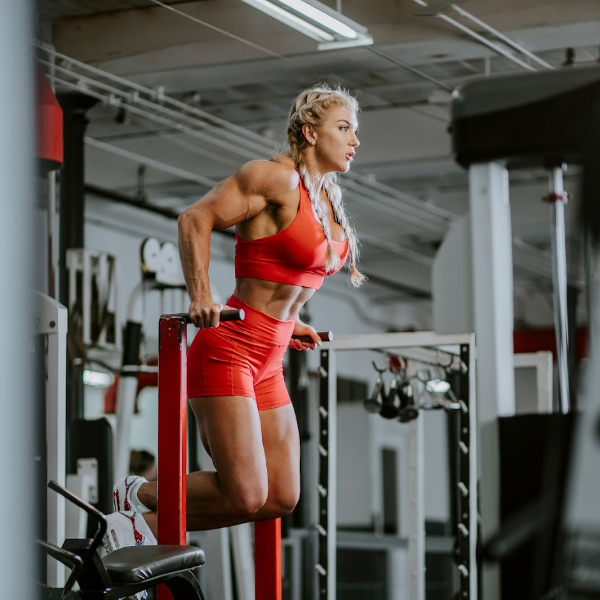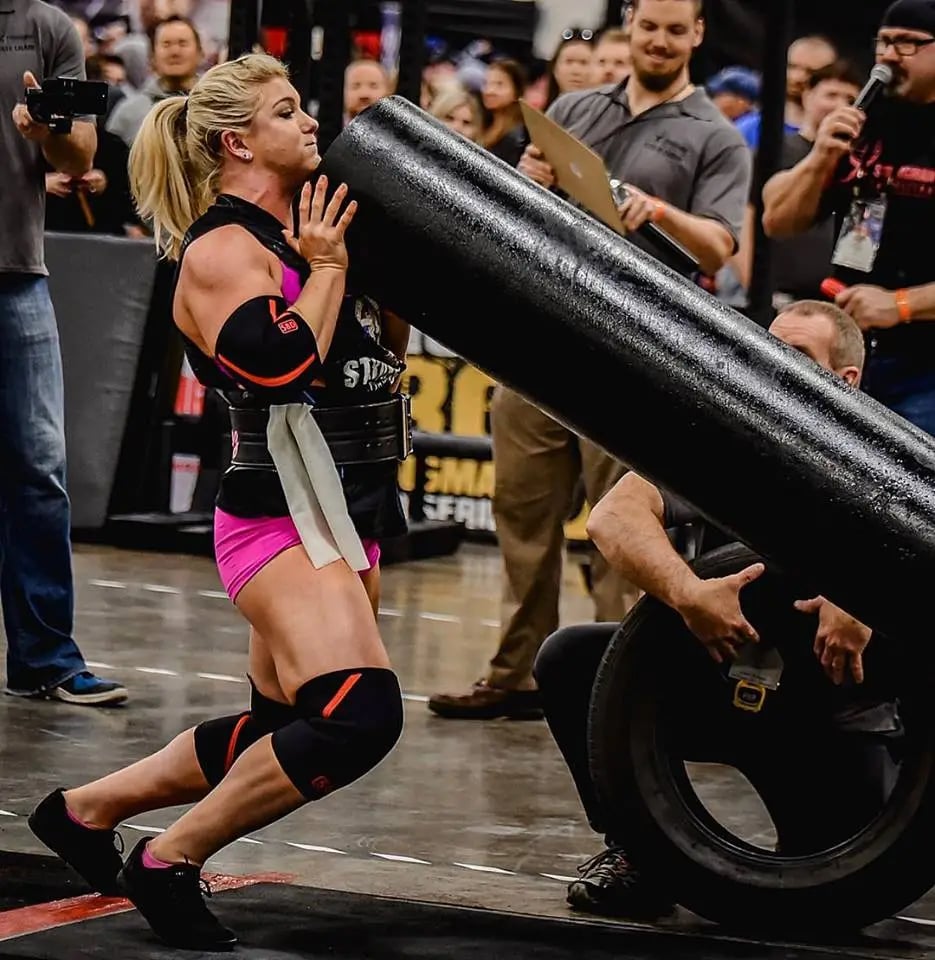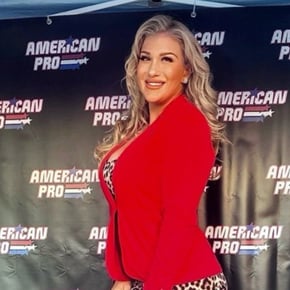
Source: Brittany Diamond
The following is an opinion and advice piece from Brittany Diamond.
“I feel like a bloated squirrel.”
“I let myself go.”
“I wish my shoulders weren’t so big.”
“Nothing fits me because of my body.”
“I can see the cellulite there now.”
“I looked so much better then.”
What negative comments have you said about your body so far today? Can you count them? How many times a day do we pick ourselves apart? How much time do we spend looking at our reflection and only seeing our flaws? How do we let this impact the overall quality of our life? Is there anything we can do to foster a healthier relationship with how we perceive ourselves?
I’ve worked with thousands of women over my athletic and training career and haven’t met a single one that didn’t have a complaint about their body. I’ve been around some of the best athletes and physiques in the world, and they all have insecurities. I feel it’s worse for athletes because we are always chasing something: a weight cut, a competition, the never-ending pursuit to just be better all around.
Body dysmorphia is a preoccupation with perceived flaws in appearance, which can significantly impact daily functioning and well-being. The prevalence of body dysmorphic disorder, also known as body dysmorphia, is estimated to affect approximately 2.0% of the general population, with higher prevalence rates reported among females compared to males.
I feel it’s worse than it’s ever been with social media in general, where it’s part of an athlete's job to post and showcase themselves. This opens the door to what I like to refer to as the comparison carousel. Social media magnifies the pressure for female fitness entrepreneurs to maintain a “perfect physique,” showcasing a never-ending array of flawless bodies, faces, and hair.
I know personally I’ve had to tell brands and photographers not to photoshop my body.
.jpeg?width=1440&height=1440&name=image-asset%20(1).jpeg)
Source: Brittany Diamond
When you’re off social media and out in the real world, you see not everyone is as perfect as they may appear on social media. You can laugh at the ludicrous expectations, but I know even the most secure people and best athletes in this industry will compare themselves.
I’ll be the first to admit, even working with a company like Parity, the ultimate destination for pro women athlete partnerships, I can think back to times where I’ve turned down collaborations with brands as I didn’t feel my body and appearance measured up to what the brand would want to see.
The following is an excerpt from my own journal:
When you are your own brand, you feel obligated to live up to the image you portray. I was able to get notoriety for how physically strong I was but also still looking feminine. I always loved being extremely girly: how I dressed, makeup, getting my hair done, and so forth was just a way for me to express myself. I fell into the trap of the saying “trying to keep up with the Joneses” only instead of comparing myself to my neighbors, I was comparing myself to other influencers also in the fitness industry.
Just like competing when you’re never fully satisfied, I started to never become satisfied with how I looked. Moving cross-country and leaving behind all of my material possessions really humbled me. I challenged myself to go with less makeup and embrace my natural look. It has been extremely hard. Most times I don’t think I’m attractive enough and I will instantly pick myself apart. It’s strange because I have confidence but am hyper-aware of my own insecurities.
I believe men feel this pressure in a different way as well. I’ve heard male athletes talk about not feeling worthy and not wanting to post if they don’t feel they look big enough. I made my brand centered around being strong and “pretty”. I cursed myself.
This is the toxicity around social media that isn’t discussed enough. I openly talk about not photoshopping my pictures but at the same time I still have surgically altered my body with breast augmentation and fillers. I fear that if I have a daughter one day at the rate the world is going and social media becoming more and more of the way of life, she will have insecurities centered around how she looks even younger than I did.
If you’ve clicked on this article, I’m going to guess you can relate, or at the very least, work in a field where you help other female athletes and their body dysmorphia. The following is advice I share with my clients and implement myself to help mitigate the impacts of body dysmorphia.
1. Embrace Body Diversity: Recognizing and celebrating the diversity of body shapes and sizes within the athletic community can help challenge these unrealistic standards. Athletes should focus on what their bodies can achieve rather than conforming to narrow beauty ideals. When women get fixated on a number on the scale, I remind them that they are more than just a number.
2. Shift Focus to Performance: Close your eyes and imagine yourself competing or in a good training session where you feel most alive. Redirecting attention from appearance to performance can be empowering and an important skill to practice. Setting goals related to athletic achievements, such as improving strength, speed, or skill, can foster a sense of accomplishment independent of appearance. Emphasizing the functionality and capabilities of the body rather than its aesthetics can promote a more positive self-image.

Source: Brittany Diamond
3. Practice Mindful Movement: Mindful movement practices can also help alleviate stress and anxiety, common triggers for body dysmorphia. Developing some sort of meditation movement practice where you concentrate on breathing and pushing away those negative thoughts can help, even if only for a few minutes when you’re engaged in the task.
4. Cultivate Self-Compassion: As you read earlier, female athletes often exhibit high levels of self-criticism, particularly regarding their bodies. Practicing self-compassion involves treating oneself with kindness and understanding, especially in moments of perceived failure or inadequacy. Encouraging athletes to challenge negative self-talk and cultivate a mindset of self-acceptance can contribute to improved mental well-being.
5. Seek Support: This is important to talk about to know you’re not alone. It’s essential to have some type of support network to break down the stigma and facilitate healing. You can turn to teammates, coaches, mental health professionals, and other people in the industry.
6. Limit Exposure to Triggers: Remember when I said social media is a comparison carousel? You are what you consume. You can curate your online environment by unfollowing accounts that promote unrealistic beauty standards or trigger you. Additionally, setting boundaries around media consumption in general and focusing on content that makes you feel good, not drained!
7. Practice Self-Care: This is thrown around so freely now and it can be hard to find the time. Since you’re an athlete, you’re already setting aside hours and hours for training. But, you must also nourish the mind, body, and soul. Find what activities work for you such as meditation, journaling, or spending time in nature.
Remember, all of this takes ongoing practice. Just like you’re dedicated to your craft, you have to be dedicated to wanting to improve your relationship with your body.
About Parity
Minority-founded in 2020, Parity's mission is to close the gender income and opportunity gap in professional sports. By developing high-impact collaborations between brands, professional women athletes and their fans, Parity has proudly put more than $3.5 million in the pockets of women athletes, attracting dozens of brands to the movement in the process. The platform offers connections to more than 1000 women athletes from 80+ sports, including well over 200 Olympians and Paralympians. For more information on how to tap into the rapidly rising influence and popularity of women athletes, visit https://paritynow.co or follow us on Instagram, LinkedIn, Facebook, X (formerly Twitter) and Threads.



-1.png?width=600&name=What%20womens%20sports%20marketing%20campaign%20should%20you%20run%20in%202026%20(1)-1.png)
.png?width=600&name=Best%20Womens%20Sports%20Ads%20Blog%20banner%202025%20(1656%20x%20600%20px).png)